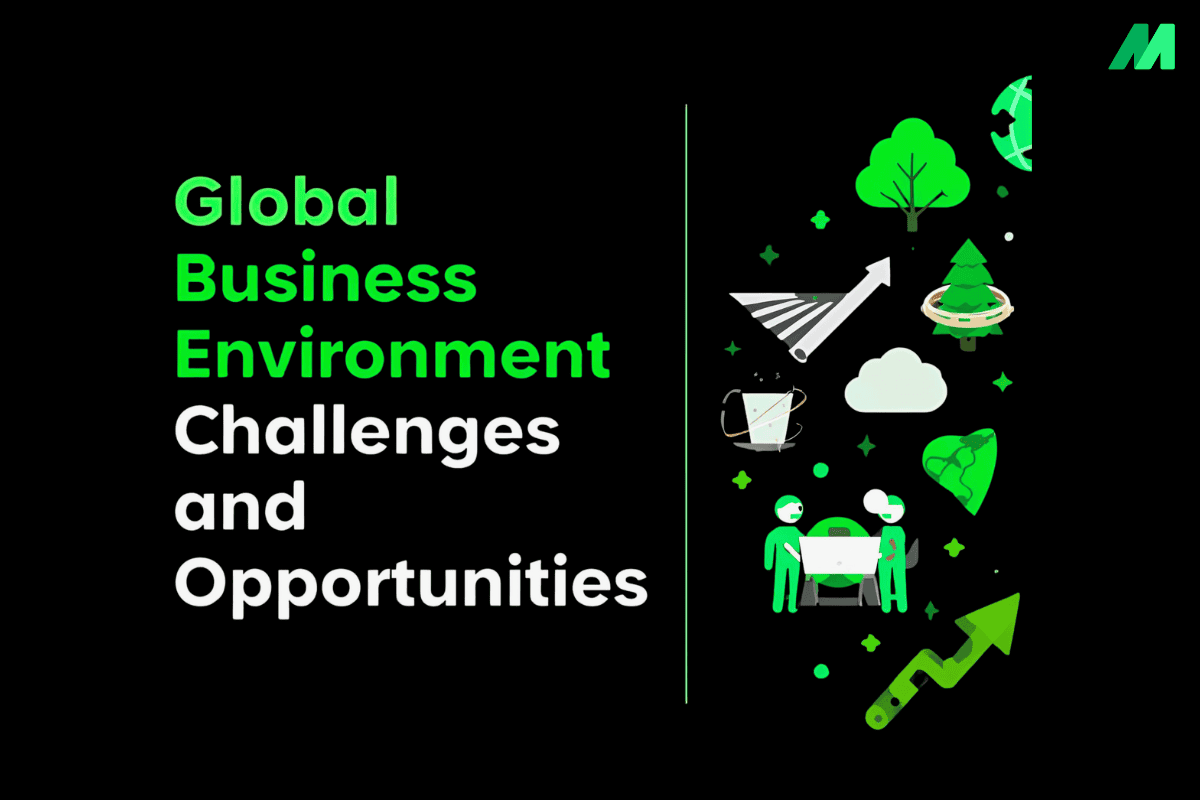In today’s connected world, businesses aren’t alone. Global Business Environment Challenges and Opportunities arise as trade policies, investments, rules, and culture affect the global business scene. To do well, companies need to get what’s going on so they can make good choices and stay ahead. Big groups like the World Trade Organization (WTO), foreign investment, trade, and how globalization changes everything are things to watch. These all bring chances and problems.
World Trade Organization (WTO): The Global Trade Arbiter
In global business environment challenges and opportunities, the WTO is instrumental in regulating international trade. It does this by establishing a set of rules that allow countries to be competitive in a regulated environment with the objective of industry success and reduced trade barriers. In addition, the Impact of WTO on global trade includes allowing countries to resolve disputes among countries, which provides an element of stability for worldwide markets.
Definition: The WTO is a world body established to regulate and facilitate international trade through trade rules among member countries at an international level to assist in promoting smooth, fair, and international free trade.
| Objectives | Features |
| Promote free and fair trade by reducing tariffs and quotas. | Binding dispute resolution system. |
| Provide platform for trade negotiation among nations. | Operates on consensus and member-driven negotiations. |
| Resolve trade disputes through formal settlement process. | Covers goods, services, and intellectual property rights. |
| Enhance transparency in trade policies. | Monitors and reviews national trade policies. |
| Support developing countries in trade capacity building. | Encourages non-discriminatory trade practices (Most-Favored-Nation). |
| Foster economic cooperation and global trade growth. |
Case Study: WTO Boeing-Airbus dispute (Case DS316)
One of the WTO trade dispute examples is the long-standing Boeing-Airbus dispute is a prime example. Both companies accused each other of receiving illegal subsidies, resulting in WTO-sanctioned tariffs impacting billions in trade. This case illustrates how complex and critical WTO interventions are in maintaining orderly trade relations.
Highlights of the WTO Boeing-Airbus dispute (Case DS316):
The long-standing dispute between Boeing and Airbus has been an excellent example of illegal subsidies. Both sides accused each other of receiving illegal subsidies, and ultimately tariffs that impacted billions of dollars of international trade, were sanctioned by the WTO. The case illustrates how complicated and important the role of the WTO is in ensuring orderly trade relations.
- The dispute concerned illegal subsidies of Boeing provided by the US, and illegal subsidies provided to Airbus by EU governments that affected fair competition in the manufacture of large civil aircraft.
- Found during the WTO rulings were illegal or actionable subsidies that caused distortion in global competition that benefitted both Boeing and Airbus.
- Airbus had received “launch aid” which is repayable low-interest loans from EU member states, some of which were found by the WTO to be illegal export subsidies.
- The US’s position claimed the subsidies given to Airbus caused lost sales, new imported displacement, and “serious prejudice” to Boeing’s business and market position.
- Boeing was shown to have accepted very large subsidies provided to them by US federal and state governments including tax breaks and research grants by NASA and the Department of Defense.
- The final outcome of the dispute resulted in authorized retaliatory tariffs applied by both parties on each other, and constituted one of the longest and costliest disputes in the history of WTO disputes.
- Boeing and Airbus both had varying degrees of success in the WTO rulings but the dispute caused an uncertainty in how trade grew in a manner that balanced national industrial support and WTO rules.
- The ruling underscored the need for negotiated settlements given new competitors entering the aircraft market (e.g., China, Russia).
Read more on the WTO dispute here
Foreign Direct Investment (FDI) in Global Business Environment Challenges and Opportunities
Foreign Direct Investment in global markets allows firms to invest in and operate business ventures abroad, providing host countries with capital, economic development and technology transfer. FDI not only diversifies a company’s portfolio, but also injects capital and innovation into the host economy.
Definition: Foreign Direct Investment occurs when a corporation or individual from one country invest in a business in another country on a long-term investment basis. FDI typically involves acquiring at least a 10% stake in a foreign company which includes ownership and control of the foreign company. FDI is considered to be an active management and control in the operations of a business.
| Objectives | Features |
| Market expansion to new customer bases. | Ownership and control over foreign enterprises. |
| Access to natural resources and raw materials. | Long-term commitment with active management. |
| Cost efficiency via lower labor costs or tax benefits. | Cross-border flow of capital, technology, and knowledge. |
| Acquisition of technology and innovation. | Benefits both investor and host country economically. |
| Gain strategic positions in stable political/economic regions. | Can be through Greenfield projects or mergers/acquisitions. |
| Facilitate global economic integration and cooperation. | Distinct from passive, short-term foreign portfolio investment. |
Case Study: Tesla’s Berlin Gigafactory
Tesla’s gigafactory in Berlin demonstrates how committed foreign direct investment (FDI) can shape the automotive industry. Certainly, Tesla ran into some regulatory challenges, and opposition from local activists was vocal, but because of its billions of dollars in investment, Tesla was able to expand Germany’s green technology ecosystem and provide jobs to many people.

Key highlights of Tesla’s Berlin Gigafactory updates as of 2025:
- Tesla’s Gigafactory Berlin has produced the 100,000th all new Model Y since beginning updated production in January 2025.
- The factory was designed solely for Model Y production, therefore allowing Tesla to MSITS growth in the competitive European EV market.
- New manufacturing processes that utilize gigacasting and automated robots, allow Tesla to produce over 6,000 vehicles each week, making the production process more efficient and lowering production costs.
- The Gigafactory Berlin is strategically essential for producing new Model Y variants to supply the EU and geographic markets, especially the Performance and Long Range versions.
- Tesla vehicles being produced at the Gigafactory Berlin will all include unsupervised Full Self-Driving (FSD) technology, providing full autonomous navigation capabilities between production area and storage area, adding logistics efficiencies to the process.
- As the Gigafactory Berlin ramps up production, the overall capacity will provide positive contributions towards Tesla global production goals while developing a stronger competitive position compared to European automotive manufacturers such as BMW and Volkswagen.
- Gigafactory Berlin growth is a testament to Tesla efficiency and drive for innovation, based on scale through automation and process imprvement to drive down costs, while clearly distinguishing Tesla from other competitors in the global EV marketplace.
- Plans for the future include expanding production capacity and potentially developing new variants of models, for particular regional industries. Read more about Official Tesla Berlin Gigafactory Updates
International Trade: The Vast Marketplace
Global trade lets companies sell to new customers and get different stuff, which helps them come up with new ideas and beat the competition. But dealing with taxes, rules, and shipping can still be a pain.
Case Study: International Trade Dynamics 2025 Netflix
Netflix changed the game by going from mailing DVDs to streaming movies online, taking advantage of globalization and sending stuff across borders digitally. This switch let them get subscribers everywhere and totally changed how we watch stuff.

Key highlights about Netflix from their official investor relations and recent updates:
- Netflix is considered one of the world’s largest streaming entertainment services, with more than 300 million paid memberships in over 190 countries.
- The company’s global rollout of services occurred in stages; it expanded into markets which shared geographic and cultural similarities, before moving into wider regions, and eventually to all international markets.
- Netflix invests a lot in local content production to fit regional audiences – they have originals from about 30 countries to represent local taste preferences (like Money Heist from Spain, Sacred Games from India).
- Netflix uses big data analytics and AI to provide personalized content, as well as to personalize the content experience around the world (“machine learning” essentially).
- To compete with different economic conditions, Netflix employs various pricing models for different regions and has mobile-only plans in lower-priced segments of India and Africa.
- Netflix’s content strategy was intending to increase spending on blockbuster original content and add live sports content for wider audiences in 2025.
- Since Netflix launched an advertising-supported subscription option in 2022, it had attracted over 15 million new subscribers Globally by mid-2025. This granularity helps Netflix balance both its revenue-generating growth with subscriber growth.
- Netflix’s ongoing partnerships with a multitude of local telecommunication and device companies allow it to easily integrate its services in different markets.
Netflix Investor Relations
Effects of Globalization: Opportunities and Challenges
The role of globalization in business growth is a major one as it connected economies, allowing for quick technology transfer and more cultural exchanges. Globalization effects on business strategy includes increased competition for businesses, vulnerabilities in global supply chains, and socio-environmental exposed to increased scrutiny.
Definition: Globalization is the process of increasing integration and interdependence between countries, particularly in terms of economic, cultural, technological, and political practices, that allows for goods, services, capital, information, and people to flow without restraint from borders.
| Objectives | Features |
| Promote global economic growth and development. | Expansion of international trade and investment. |
| Facilitate international cooperation and peace. | Global spread of technology and information. |
| Increase market access and economic opportunities. | Increased movement of capital, labor, and goods across borders. |
| Enhance innovation through sharing technology and knowledge. | Emergence of multinational corporations worldwide. |
| Encourage cross-cultural exchange and understanding. | Cultural blending and global reach of media and communication. |
| Drive competitive efficiency and consumer choice worldwide. | Challenges: economic disparities, cultural homogenization, environmental impact. |
Case Study: Fast Fashion Industry
Fast fashion shows this double-sided thing. Big names like Zara and H&M have gone global, but they’re taking heat for hurting the planet and how they treat workers. This is pushing the whole industry to be more sustainable.
Highlights:
- The fast fashion biz guzzles water like crazy, it’s the second biggest user on the planet. Making one cotton shirt? That’s 700 gallons down the drain. Jeans? A whopping 2,000 gallons.
- And get this: fashion is responsible for about 10% of the world’s carbon emission, that’s worse than all those planes and ships traveling everywhere!
- Dying fabrics is also a big problem. It’s the second biggest cause of water pollution worldwide. All that nasty, colored water just gets dumped into rivers and lakes.
- Plus, those fake fabrics like polyester? They release tiny plastic bits when you wash them, making up about 35% of the plastic in our oceans. Polyester is most of it.
- The clothing biz also eats up fossil fuels, grabbing 1.35% of the world’s oil to make those fabrics.
- in 2025, the fast fashion market is worth about $150 billion.
- Every year, about 85% of our clothes get tossed in the trash. The US alone scraps over 11 million tons of clothes each year.
- Even cotton needs tons of water, bug killers, and plant food, which isn’t great for the Earth.
- Making leather involves dunking it in really bad chemicals, which then pollute the water.
- The clothing industry also struggles with treating people well. Lots of workers, especially in poor countries, have bad working conditions.
- Fashion Revolution is pushing for a better fashion world that’s clean, fair, and open, and that cares about the planet and people.
Environmental impact report by Fashion Revolution
How FDI, WTO, and Globalization Affect New Businesses and Startups In India?
| Factor | Impact on Indian Startups | Key Benefits | Challenges | Examples / References |
| Foreign Direct Investment (FDI) | Provides crucial capital for scaling and expansion | Access to global funding, expertise, and markets; job creation; technology transfer | Dilution of control, regulatory complexities, dependency risks | Byju’s, Swiggy, Paytm, Tesla (Gigafactory Berlin influence); [Entrepreneur Guild]entrepreneurguild, [LegalWiz]legalwiz |
| World Trade Organization (WTO) | Enables startups to trade globally with reduced barriers | Fair trade practices, dispute resolution, transparency | Complying with complex trade regulations can be resource-intensive | Indian startups access global markets via WTO rules; Boeing-Airbus WTO dispute [WTO DS316]wto+1 |
| Globalization | Expands market access, fosters tech adoption, intensifies competition | Greater innovation and diversified revenue; cultural adaptation; CSR focus | Fierce global competition; adapting to diverse cultures and regulations | Netflix’s global expansion; Fast fashion industry’s sustainability challenges [Netflix IR]fashionrevolution, [Fashion Revolution] |
Successfully engaging with the global business environment requires understanding of global developments, international rules, investment flows, and the multiple implications of globalization. Firms with a strategic and lasting approach; balancing growth, values, and regulatory compliance will have a better chance of sustainability in global business over time.




